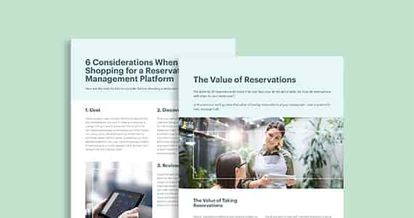Building a restaurant is not a one person job; you need to build a team of restaurant experts with proven experience in their field and in the restaurant industry to help you build a foundation for success.
You could research yourself to death, put your best effort into reworking the wheel meticulously, and still succumb to unforeseen pitfalls that would be common knowledge to a restaurant expert. This is why it’s so important you work with professionals who have developed a specific or niche area of mastery in the complex, make-or-break restaurant industry.
Here, we’ll explore the necessary players to add to your roster of restaurant experts as you open your restaurant, what they do, why you should hire them, their costs, and how to get them on the job efficiently.
Restaurant Consultant
What does a restaurant consultant do?
The job of a restaurant consultant can manifest in the following ways:
- They identify blind spots in your plans in order to establish sound processes from the very get-go, while ensuring efficiency and opportunities to generate more revenue.
- They take on a specific workload in order to alleviate the burden from management so you can focus on your day-to-day expertise
- Provide a specific, unique skillset that you don’t have.
- Provide you with an action plan in order to optimize processes in the short-term and long-term.
The difference between business consultants and restaurant specific consultants is that restaurant consultants often come from a long career in the restaurant industry, some are former chefs or owned restaurants themselves.
They use their earned body of knowledge in order to advise you in the specific area you’ve hired them for.
Types of restaurant consultants:
You can hire a restaurant consultant to assist you in just about any of the tasks associated with opening a restaurant. Here are just some of the services restaurant consultants can offer:
Opening a Restaurant:
- Developing a business plan
- Menu development
- Brand development
- Concept development
- Site selection
- Systems and procedures implementation
- Staff training and selection
- Kitchen design
- Equipment and technology selection
Funding:
- Identifying fundraising opportunities
- Attracting investors
Real Estate:
- Site selection
- Mergers & acquisitions
- Strategic location evaluation
- Landlord and tenant representation
Restaurant Management:
- Cost control processes
- Sales and inventory analysis
- Human resources
- Labor optimization
- Recruitment
- Staff training
- Compliance
- Manuals, policies, checklists
- POS and backoffice strategy
Restaurant Bookkeeping:
- Establishing financial reports
- Establishing budgets
Restaurant Marketing:
- Digital marketing and social media
- Traditional marketing
- PR and media relations
- Branding and brand development
- Web design and SEO
And after your restaurant is open, restaurant consultant can be used for:
- Ongoing recipe analysis and development
- Menu engineering
- Systems and procedure analysis
- Concept makeover
- Food and beverage programs
- Compliance
- Technology implementation
- Nutritional analysis
- Profitability analysis
- Concept performance assessment
- Financial forecasting
What does a restaurant consultant charge?
The hourly rate for a restaurant consultant can be anywhere from $99 – $350 per hour. While one size doesn’t fit all, there are a few pay structures you might encounter when choosing to work with a restaurant consultant.
Fixed fee:
Typically for smaller projects, fixed fees involve clearly defined deliverables, regardless of the time the consultant allocates to the project. For example: a business plan including detailed financial projections could be billed using a fixed fee.
Hourly rates with retainer:
For ongoing projects, hourly rates with retainers are common. The consultant may ask for a retainer at the beginning of the project which applies towards a specified allotment of time. Once the retainer is used, you will be billed by the hour for additional work.
Quoted projects:
For some projects, consultants might bill via a quote. In their quote, they will delineate all the deliverables and hours with any deviation being renegotiated as the project progresses.
Often, quoted projects require a 50% down payment, with the other 50% billed at the time of project completion, subject to your approval.
We should note that the consultant’s travel and expenses are often at your cost.
How to hire a restaurant consultant:
When it comes to selecting a restaurant consultant, it’s best to find someone local and trusted.
Trust can be established through a referral, say from a past colleague or industry peer. Otherwise, you’ll have to look to the internet for options.
During your selection process, you’ll want to keep your eyes peeled for the following performance indicators:
- Cost
- Proven results, case studies and testimonials
- Can they meet your timelines?
- Are they aligned with your vision?
It’s not uncommon when selecting a restaurant consultant to request a proposal for work. A proposal is essentially a summary of the project scope. It includes:
- Project scope: Background information, the consultant’s role, role of restaurant staff (including you!) summary of issues based on discussions, and the approach to the project.
- Deliverables: information the consultant needs from you to get started.
- Deadlines: a timeline of milestones and deliverables.
- Costs: fee structure, expenses and the payment schedule.
Local restaurant consultants
New York
Chicago:
Toronto:
Restaurant Insurance Broker
Restaurant insurance broker responsibilities?
Restaurant insurance brokers are your ally in insuring your restaurant against disaster and liability, which is especially important in laying the foundation for your restaurant.
You need insurance broker from the get-go. They seek to understand your restaurant while using their knowledge of the industry and local regulations in order to assess your specific insurance needs and assist you in the event of a claim.
Since they know the ins and outs of insurance providers, they can help save you money by combining different types of insurance. They sell for multiple insurance companies, so they have a big, broad view of the industry.
Their task is to:
- Compare different insurers objectively in order to get you the best deal and the best coverage for the insurance you need.
- Identify opportunities to reduce premiums by locating discounts and combining various types of insurance.
- Understand the fine print.
- Explain the intricacies of insurance contracts to you in a way you can easily understand.
- Understand a complete insurance package for your risks vs. a package that leaves you vulnerable.
- Advise revisions to your policy should your situation change.
- Ensure claims are fairly handled.
- Be available to answer questions before and after you purchase coverage.
Types of restaurant insurance:
Depending on your local and federal operating policies and the specifics of your establishment, the insurance you require might vary. The following is a list of insurances common to restaurants, however, policies and their intricacies will vary from provider to provider.
- Business Owners Policy (BOP): This is your classic “customer slips on wet floor and decides to sue” policy. As a bundle, this insurance often includes general liability insurance, general risk insurance and property insurance, sometimes at a discounted rate.
- Workers’ compensation: This insurance assists in covering the medical costs and lost wages for employees who become sick or injured while on the job.
- Business crime: This insurance protects you from internal and external crime, a common problem for restaurants.
- Liquor liability: This is your safety net in case of a liquor related incident. Depending on the policy, this coverage covers liquor-related injuries, assaults or accidents that occur both in the restaurant and after the patron leaves.
- Food spoilage: Power outage? Broken fridge? Mechanical breakdown? If you’ve lost all your inventory, this insurance will reimburse you.
- Food borne illness/contamination insurance: If your restaurant is shut down by the government due to contamination issues, this insurance pays for everything from your loss of income during the time your closed, to the medical treatment of employees during the closure, to replacing the contaminated food.
- Business interruption: In the event of disaster, this insurance covers the loss of income due to the closing of that business or due to the rebuilding process.
Read our restaurant insurance guide to learn more.
How much does an insurance broker cost?
They’re free! For you at least.
Typically, insurance brokers are paid a commission through the insurance company that you choose to cover you, so you don’t pay outright, however their commission is sometimes reflected in the insurance premiums.
How to hire an insurance broker:
The usual rules apply: ask for references and referrals, licences, look for a specific focus in restaurant industry insurance.
You can source your broker’s discrepancy record (the instances where they’ve been sued by a client) by calling your local insurance commissioner’s consumer hot line.
Note that large firms and small firms may differ in their business processes. For large firms, ensure you have a dedicated account representative and won’t be passed along to multiple people when an issue arises. Smaller firms might have less resources than larger firms.
Ensure you’re clear on renewal terms from the beginning. The renewal process should begin 3-4 months before the deadline and should be up for review annually to ensure your specific requirements, restaurant activities, and growth still match your insurance.
Local restaurant insurance brokers
New York City:
Chicago:
Toronto:
Restaurant Real Estate Broker
What does a commercial real estate broker do?
Restaurant real estate brokers, also known as commercial real estate agents, are responsible for helping restaurateurs buy and sell restaurants, listing restaurant properties and negotiating leases between restaurant tenants and landlords.
They have access to information that the average restaurateur would not. This includes:
- private listings
- lease agreements
- complex government regulations
- building and construction clauses.
For buyers, restaurant real estate brokers will create a business profile for you based on your objectives and match-make a restaurant that fulfills your needs.
They negotiate the terms of sale, conditions, and handle all the paperwork, including the transferral of licences and acquisition of necessary permits.
Restaurant brokers can also help you negotiate restaurants leases or lease restaurant property. They will handle the lease negotiations including changes to the space, like tenant construction.
For tenants, they will handle upfront rent negotiations and find a space that fits your needs.
How much does a commercial broker charge?
Most restaurant real estate brokers are contingency based. This means they don’t make money until you lease a property or purchase a restaurant. They earn their income based on a percentage of the total lease or sale price.
In order to ensure you get the best deal, some restaurant real estate brokers will charge a minimum fee. This guarantees that they will still be fairly compensated for their work and get you the best deal possible at no cost to them.
Often for leases, the property owner hires the broker – a listing agent – and the listing agent shares their commission with the agent used by the tenant. Because of this model, you as the tenant will usually receive their agent’s services for free.
How to hire a restaurant real estate broker:
You want to select a single, exclusive broker to handle your real estate needs.
An exclusivity agreement means that you agree only to work with that single broker and they work to represent your interests, giving you the attention you need while ensuring their efforts will not be lost due to competition.
When you’re working out your contract with your broker, ensure you have the right to cancel the agreement in case you are dissatisfied with their work.
Local restaurant real estate brokers
New York:
Chicago:
Toronto:
Restaurant Bookkeeper
What does a restaurant bookkeeper do?
Restaurant bookkeepers have an intimate relationship with the finances that drive restaurant businesses. You can hire a restaurant consultant from the start to:
- Perform general bookkeeping
- Consult on financing
- Create budgets and manage finances for a new restaurant launch
- Perform financial analysis and business modelling
- Perform prime cost analysis
- Manage payroll
Later, you can extend their services to include:
- Manage cash flow
- Analyse overhead
- Detect POS irregularities and review systems
- Create budgets and forecasts
- Eliminate redundancy and simplify accounting processes
- Taxes
- Audits
Restaurant bookkeepers are dual experts both in accounting and the volatile, unpredictable hospitality industry in a way that the average restaurateur is not.
When you can outsource the time-consuming task of financial analysis and the nitty-gritty of the daily tasks associated with the numbers, you can free yourself up for actually running the numbers and making business decisions.
Not to mention, a restaurant bookkeeper will help you create a sound financial future for your business from the very beginning so you avoid overspending in a time when fund conservation is key.
Restaurant bookkeepers can identify shortcomings and cost leaks in a way an untrained eye might not be able to. They can often act as consultants in that the financial trends they identify might prompt managerial action or procedural changes.
How much does a restaurant bookkeeper cost?
Most restaurant accountants and bookkeepers charge by the hour.
The cost of a restaurant bookkeeper depends on the scope of their work, their seniority, and the size of the firm.
General bookkeeping services by junior staff might cost around $60-120 per hour, whereas CPAs (Chartered Professional Accountants) can cost between $150-$250 per hour.
Fixed rates might be applied to general bookkeeping and taxes, but generally fixed fees are more risky for the accounting firm because unanticipated and unforeseeable situations often occur.
How to hire one:
You can go through a large accounting firm or a small mom and pop shop.
As a rule with all experts, ensure the accountant of your choosing has restaurant specific experience. Ask to see credentials – are they a CPA? – and references with tangible, quantifiable results.
While their hourly rate is the rule, you can control the seniority of the person completing your accounting tasks which will help contain your costs. If a senior CPA is doing menial work, there’s an issue.
Alternatively, if a junior CPA is doing a day’s worth of complicated work that a senior CPA could do in an hour, this is equally as detrimental to your bottom line.
Local Restaurant Bookkeepers
New York:
- CFO Business Growth Solutions, LLC Nationwide Restaurant Accounting Services
- Bookkeeping Chef
- Scott Aber CPA
Chicago:
Toronto:
Restaurant Lawyer
What does a restaurant lawyer do?
There are many a situation that will call for a restaurateur to lawyer up. Some scenarios might require restaurateurs merely to get legal guidance.
For example: when drawing up contracts, managing labor matters, trademarking and dealing with regulators as you establish your restaurant.
Other scenarios will require much more involvement from the restaurant lawyer.
Here are possible situations where you’ll need legal counsel when opening your restaurant:
Business Formation: Advice on everything from registering your business, to understanding your liabilities to drafting the necessary documents so that your restaurant is recognized as a business entity.
Business and Real Estate Transactions: This can cover every legal aspect of the restaurant real estate involvement. Financing, zoning, land purchase, construction, according to local, federal, and provincial law and policy.
General Permits: Counselling on all necessary permits needed to operate.
Intellectual Property: Keep mama’s secret gravy recipe a secret! A restaurant lawyer can help you obtain, protect and enforce patents, trademarks, copyrights, trade secrets and other intellectual property rights.
Corporate and Securities / Partnerships and Joint Ventures: This includes legal issues pertaining to M&A, financings, joint ventures and securities transactions.
Financing and Tax: For legal matters pertaining to acquisitions and investments into property, refinancing or debt restructuring, leaseback transactions, securitized lending, mortgages and financing transactions.
Later on, you might need to attain a restaurant lawyer for the following:
General Litigation: Think prosecutor, defendant, bench, jury. This includes legal issues pertaining to fraud, foreclosure, landlord/tenant disputes, professional liability, personal injury, negligence, banking and finance, franchise terminations and breach of contract.
Restaurant Restructurings: This includes disposition, loan settlements and reorganization.
Partnership, Operating & Shareholder Agreements: All legal considerations revolving around ownership.
Liquor Licence: Infringements and applications.
Labor and Employment Law: Labor disputes, pension and benefits plans, wage and tip issues, compliance with labor laws, discrimination, harassment, and general grievances.
Other: Music licensing disputes, equipment leasing, claims against insurers, non-compete agreements
How much does a restaurant lawyer cost?
Billing models are often situational, either due to the nature of the legal issue or the preference of the firm. They include:
Hourly or per diem:
For new restaurateurs, you’re likely looking at a restaurant lawyer costing between $150-$800 an hour.
This is dependant on seniority, with junior restaurant lawyers being paid on the lower end of the spectrum. As with accounting, if a senior lawyer is doing menial work for a high cost, there’s an issue.
Alternatively, if a junior restaurant lawyer is doing a day’s worth of complicated work that a senior CPA could do in an hour, your bottom line will suffer so be clear on who’s assigned to the different components of your issue.
Flat fee:
Restaurant Lawyers may charge a flat fee for routine matters, but often you must ask. As with consultants, you should negotiate this fee and consider disbursements like expenses, filing fees and courier charges.
While most flat fees are paid upfront, you can ask to hold back 10-20% of the flat fee in order to ensure you’re satisfied with the lawyer’s performance.
Monthly retainer:
Some restaurant lawyers will also ask for a retainer against future fees. You will have to ensure that in your contract you specify the money will be returned if the time is not consumed.
If you anticipate a lot of interaction with your lawyer, this can help you get all the legal advice you need without skyrocketing your costs.
Contingency fee:
This is reserved for more complex matters. The restaurant lawyer works on a contingency basis so if they save/win you X amount of dollars, they receive a portion of those proceeds.
Partial contingency (or value billing) is when a restaurant lawyer charges a higher rate if they win.
How to hire a restaurant lawyer:
Make sure the lawyer you choose specializes in restaurants. This will save you time and thus, money, in the long run.
When choosing a restaurant lawyer, consult with peers and get solid references. You need to establish trust with a restaurant lawyer – and you have to like them!
Make sure you capture everything in writing, from your quote on the matter and a cap on the price you’re willing to pay for their services. Ask about billing increments as some lawyers may charge by the quarter hour, half hour or complete hour, while others will bill to the minute.
When choosing your restaurant lawyer consider the pros and cons of whether they come from a large firm or a small firm. Large legal firms, while more expensive, have all legal resources under one roof, plus the added benefits of a more prolific reputation – a letter from a reputable restaurant lawyer from a large law firm has more weight than a smaller practice.
They might also be able to connect you to more resources, which could save you money in the long run. Small legal firms, on the other hand, might be more cost effective in the short term.
Local Restaurant Lawyers
New York:
Chicago:
Toronto:
Restaurant Construction and Remodelling
What do they do and when to hire them?
When renovating or redesigning a space for your restaurant, leave it to the experts.
You might have a vision but you’ll need to employ a team with skills in construction, permitting, and design to bring it to life.
Restaurant construction and remodelling experts are often composed of architect, designer and a contractor, to name a few. These can be hired individually or from a single company.
Restaurant contractors
They’re in charge of composing your working drawings. Working drawings include plans for your space, elevation of the current space, and associated schedules.
A cumulative effort between many design consultants, engineers, and architects, the final drawings are submitted to your local building and health department.
They include a variety of plans, including those for:
- demolition
- floor
- construction
- kitchen equipment
- electrical
- exhaust
- furniture and fixtures
Restaurant contractors are also in charge of making sure your restaurant construction plans comply with building codes, health codes, fire codes, and any city planning or architecture boards.
A restaurant contractor will also manage subcontractors and work with interior designers, architects and engineers.
Interior designers
In addition to making your restaurant pretty, interior designers ensure it’s functional. They design the front of house, including the exterior, as long as its non-structural work.
Working with you to choose a look and feel, interior designers bring your vision to life according to a budget you decide.
Architect
While interior designers deal with non-structural work, architects deal exclusively with structure.
Architects are necessary to hire if you’re working with a non-traditional space, like converting a home into a restaurant.
They ensure your building is up to code, that your structure can handle the weight of a restaurant – sometimes literally!
Restaurant equipment is heavy and floors might need reinforcing.
All restaurant design plans must be submitted to country, state/province, county and city boards – depending on their codes, requirements and regulations – by a licensed architect to ensure that the design, architecture, mechanics, electrical and plumbing plans are sound.
How much do restaurant construction experts cost?
Unfortunately there’s no set rule for the cost of restaurant construction experts. As with any renovation, the costs can compound significantly beyond an initial quote as building complexities are unearthed.
One opennu article quotes the following research:
“Restaurants are normally built to cost $85 to $300 per square foot.
A 3,000 square foot restaurant can cost, on average, anywhere from $250,000 to $1,000,000 to build from the ground up.”
Typically, design costs fall around 10%. So in the example above, design costs would take up $25,000 to $100,000 of total planned expenditures.
How to hire restaurant contractors:
When it comes to hiring for your restaurant construction project, references are the end all be all. Make sure you talk with satisfied customers.
While digital portfolios are a starting point, you need to make sure that contractor didn’t leave past clients high and dry, that they completed their projects on (or close) to budget and on time.
Investigate their associations with trade organizations and necessary licences. Their performance directly impacts your ability to even begin your business. It’s critical to do your due diligence and ensure your contracting team is legitimate and high performing.
Local Experts
New York:
Chicago:
Toronto:





